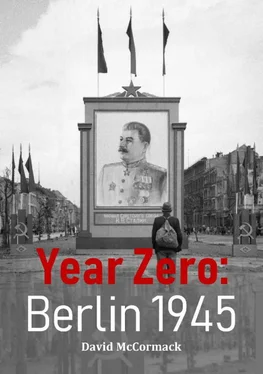Boev: I am a Russian officer, speaking from Siemensstadt. I should like to ask you a few questions.
Goebbels: Please go ahead.
Boev: How long can you hold out in Berlin?
Goebbels: Several (remainder inaudible)
Boev: Weeks?
Goebbels: Oh, no. Months. Why not? Your people defended Sevastopol for nine months. Why shouldn’t we do the same in our capital?
Boev: Another question. When, and in what direction will you escape from Berlin?
Goebbels: That question is far too insulting to deserve an answer.
Boev: You must remember that we will find you, even if we have to comb the ends of the earth. And we have prepared a scaffold for you. Is there anything you would like to ask me.
Goebbels: No (hangs up).
Boev’s somewhat clumsy attempt to pry into the mind of the minister failed to elicit any real information, or insights into Goebbels’ mind. He could have got the same information from reading a four-paged propaganda sheet entitled Der Panzerbar (The Armoured Bear) which appeared following the closure of Berlin’s newspapers. For the citizens of Berlin, few gained much solace from reading hackneyed old lines such as, ‘The Reich is at stake – Berlin will be faithful to itself and to its past’, or warnings about life under Soviet overlords, ‘A Negro slave’s life is no goal for us’. Even fewer chose to believe the assurances that German reinforcements were coming to the rescue of besieged Berlin. Most people looked to their immediate problems, a lack of food following the breakdown of distribution services and a daily quest to find clean water.
It was not only the civilian population of Berlin that was being starved of provisions. General Weidling also desperately needed ammunition and medical supplies for his hard pressed troops. Some attempts at bringing in supplies by air were made, but with limited landing facilities on the improvised runway along the East-West Axis, it was a case of too little, too late. The desperate supply situation was later described by Weidling, following a visit to Major-General Barenfanger, commandant of the eastern sector of the central defence zone:
Potsdamer Platz and Leipziger Strasse were under heavy artillery fire. The dust from the rubble hung in the air like a thick fog. Shells burst all around us… Dodging Russian mortars, we made our way to the U-Bahn station by bounds. The roomy U-Bahn station, two storeys deep, was crowded with terrified civilians. It was a shattering sight… From Platform ‘E’ we walked through the tunnel as far as Schillingstrasse station to General Barenfanger’s HQ. Barenfanger reported strong Russian attacks near Frankfurter Strasse… A considerable number of enemy tanks had been destroyed in his sector. He now pressed me for more men and ammunition, but I could promise him neither. Most of Barenfanger’s men were Volkssturm troopers that had been sent into the fighting with captured weapons, French, Italian, etc. No ammunition for these weapons could be found anywhere in Berlin… On my way back, I visited one of the hospitals. It was terribly overcrowded. The doctors simply could not cope with the number of wounded. There was hardly any light or water.
There was to be no respite. Gradually, Weidling’s forces were squeezed into a pocket which by the close of the following day measured some ten miles from east to west and a mere three and a half miles wide. The air-drops on which Weidling now depended for supplies were temporarily disrupted following the blocking of the improvised airstrip by a Ju-52 transport plane which had crashed whilst attempting to take-off with its cargo of wounded troops. Parachute drops were planned, but they could deliver only a fraction of the supplies needed.
By the end of 27 April, Chuikov’s forces were converging on the main prize, the Reichstag. To the east, Berzarin’s forces had advanced as far as the Lustgarten. Whilst to the north, Kuznetzov’s troops had broken into Moabit. Zhukov was clearly winning the race to the Reichstag. However, Konev had not yet given up hope of taking the prize as spearheads from his own forces had advanced as far as the Hohenzollerndamm. He then issued orders for Rybalko’s tank troops and Luchinsky’s 20 thCorps to capture the whole south-western sector of Berlin, followed by an advance to the Landwehr Canal by the end of 28 April. With Chuikov’s troops advancing in the same direction, there arose the very real possibility of a collision between the two forces. Therefore, Konev took the decision to turn Rybalko’s forces to the west, away from the main prize. Konev later recalled his conversation with Rybalko:
The telephone conversation I had with Rybalko on the subject was quite unpleasant. He said he did not understand why his corps which were already aimed at the centre of the city should, by my order, be turned west and the direction of their advance changed. I appreciated his feelings as army commander, but all I could say was that the offensive of the 1 stBelorussian Front against Berlin was going well, and that the centre of Berlin was, according to the established line of demarcation, in the zone of the 1 stBelorussian Front.
Knowing Rybalko, as I did, I must say that his dissatisfaction was not due to the fact that he wanted to take a few more streets and squares in order to become famous. He had already won enough fame. But finding himself in the very thick of the fight and seeing a direct chance to speed up the clearing of Berlin, he literally had to crush his own impulse in order to carry out my order. I am certainly not inclined to censure him for feelings I can very well appreciate.
Konev then went on to state his own views regarding the situation. Though it has to be remembered that his memoirs were written in accordance with Soviet protocols which at the time aimed to portray a unified command structure:
As for my own personal views, I believe that at that period an exact line of demarcation between the two fronts had to be established. It was necessary to rule out any chance of confusion, losses caused by our own fire and other trouble caused by troops getting mixed up, especially in street fighting. I accepted the corrections made in the line of demarcation as necessary and considered them dictated by higher interests.
In truth, Konev was as bitterly disappointed as Rybalko. The prize would after all go to his rival, Zhukov.
On 28 April, General Weidling informed Hitler at the evening conference that the supply situation was so critical that his units had only enough ammunition left for two further days of combat. He then put the case forward for a breakout, ‘Speaking as a soldier, I think the time has come to risk breaking out of encircled Berlin, so as to put an end to the incredible suffering of the population’. The propaganda minister and self-styled defender of Berlin was the first to react to the suggestion of a break out, Weidling recalling that ‘Goebbels pounced on me and, using some strong language, tried to make much of my solid presentation sound ridiculous’. Perhaps Goebbels took the lead in denouncing Weidling’s suggestion as Hitler’s mind appeared to be elsewhere. As indeed it was.
Earlier in the day, word reached Hitler via the Reuters news agency that Himmler had made an offer of capitulation to the western Allies. For Hitler, this was the worst betrayal of all. The aviatrix Hanna Reitsch, who had made a hair-raising flight into Berlin with General Robert Ritter von Greim two days previously, later described Hitler’s reaction by stating that, ‘Hitler raved like a madman. He turned a dark red, and his face became almost unrecognisable’. Later that night, Hitler composed himself and ordered Reitsch and the newly appointed commander of the practically non-existent Luftwaffe to leave Berlin. Their task was to ensure that Himmler was found in order to receive his just punishment. Unable to take his wrath out on Himmler directly, Hitler satisfied his thirst for vengeance by having Himmler’s adjutant General Hermann Fegelein executed. Eva Braun made little attempt to intercede for her brother in law, who by a process of calculation and opportunism had inveigled himself into Hitler’s court circle. After his execution, all she could say was ‘Poor, poor Adolf. They have all deserted you; they have all betrayed you’.
Читать дальше












